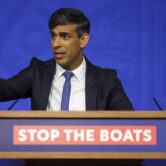On the day of his arrest in a massive money-laundering scheme that still sours relations between the United States and Turkey, Reza Zarrab was consumed by his true passion: the sea.
"I will book myself a hire car at the airport to take all scuba equipment and I'll find a hotel near yours," Adam Wood, his then-divemaster and asset manager said in a WhatsApp message sent March 19, 2016, as the two were about to depart for Florida.
“Write to this [sic] people,” Zarrab told Wood, who had pasted a link to a company that built a drone submarine Zarrab wanted for his growing fleet of ships and subs of ships and subs.
Hours later, Zarrab, then 33 years old, stepped off a plane and was handcuffed by FBI agents at Miami International Airport. His diving adventure would be diverted to a federal prison.
Zarrab later admitted in court to helping the Islamic Republic of Iran evade economic sanctions through a money-laundering scheme that U.S. federal prosecutors say threatened international security and set back nuclear non-proliferation in the Middle East.
Before becoming the U.S. government’s star witness in the $20 billion scheme, Zarrab was famous as the “Turkish Gatsby,” known for high living, access to top government officials and his marriage to Ebru Gündeş, a famous Turkish singer and actress.
Zarrab exploited his father’s ties to the Iranian regime to greatly expand his family’s modest money-changing business into a wide-ranging criminal enterprise built on smuggled suitcases full of gold and cash; forged documents; industrial-scale bribery of Turkish politicians; and allegedly using the Turkish state bank Halkbank as a money laundry.
Perhaps the Turkish-Iranian businessman thought himself a patriot, helping his people in Iran bring home money trapped in foreign banks by harsh international sanctions.
Or perhaps the 8% commission was enough of a draw.
Big Money For His Passions
It’s likely the exact amount of Zarrab’s fortune — and how much he retains even after his U.S prosecution — will never be known.
Zarrab in 2016 declared during a pre-trial interview that he had an annual income of $720,000 from exporting gold, selling furniture and other ventures.
That was an obvious lie.
On Turkish television in 2014, he bragged about exporting as much as a ton of gold per day.
Even at a conservative estimate of $300 per ounce, that volume would generate $3.5 billion per year, U.S. prosecutors later noted. His commission would have been $280 million per year.
He had expenses, of course. He said he reserved half for bribes and other expenses, bringing his annual take-home pay down to perhaps $140 million from gold alone.
The gold trade was one part of the sanctions-evasion scheme, which lasted at least five years and represented only a portion of Zarrab’s money-laundering business.
An itemized inventory discovered by U.S. prosecutors outlined Zarrab’s high-value assets in 2014: six expensive racehorses, 17 luxury cars, more than $10 million in artwork, 24 firearms used by his security detail and 20 properties in his name with three more held through his business or family. The list also included seven sea-going vessels registered to Maltese and U.S. limited liability corporations.

As the list suggests, Zarrab liked his boats.
In July 2015, as six world powers reached an Iran nuclear limitation deal after years of painstaking negotiation, Zarrab was summering aboard the 60 Years, his 46-meter yacht based at the Turkish resort of Bodrum. He was also overseeing plans to build a superyacht nearly twice as big and able to accomodate three submersibles.
Wood, an English divemaster, was hired in 2014 to manage Zarrab’s seagoing assets and assemble what he described on a CV as the “largest collection of privately-owned rebreathers, dive equipment and associated diving accessories in the world.”












